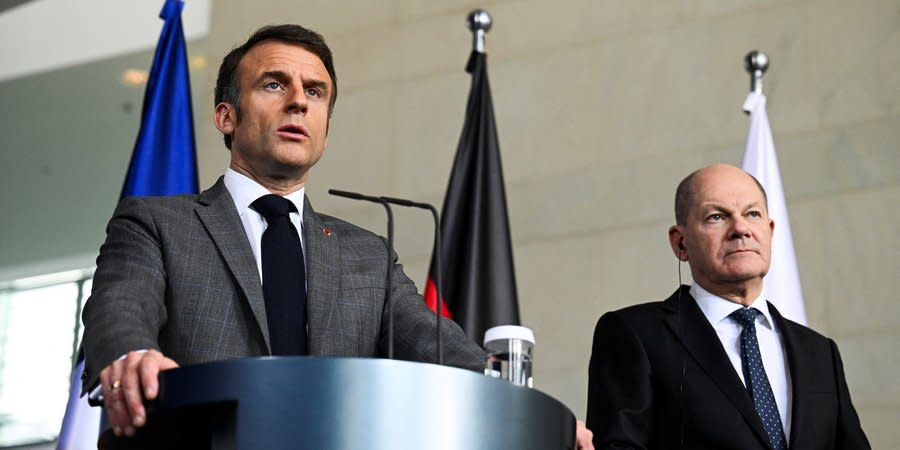Macron's plan for Ukraine faces scrutiny from U.S. and German leaders

- Oops!Something went wrong.Please try again later.
- Oops!Something went wrong.Please try again later.
French President Emmanuel Macron held confidential talks in February with Joe Biden and Olaf Scholz to change the West's strategy in the war in Ukraine and push allies to take a tougher approach to Russia, The Wall Street Journal reported on April 3.
Macron hoped to establish a foundation for a Ukraine-focused summit in Paris in February. Following the summit, the French leader hinted at the possibility of deploying French troops to Ukraine.
Macron believes that Western allies should adopt a "position of strategic ambiguity towards Russia" that leaves all military options on the table and stop mentioning "red lines."
Biden questioned the change in strategy, fearing that it could lead to escalation, according to the WSJ. The White House is worried about a possible Russian strike on French troops if they go to Ukraine, which could draw other countries into the war.
Read also: Macron attempts to influence Brazilian leader’s stance on Russia’s war in Ukraine
Scholz also opposed Macron's proposal, stating that it could create divisions among allies and make NATO countries parties to the conflict. The German chancellor reportedly cautioned Macron that a public statement would force him and other leaders to reject it, strongly advising Macron to abandon the idea.
Despite this, the French president made a surprising public statement on the same day, voicing ideas that had been privately dismissed by other leaders.
Behind the scenes, French officials have clarified that Macron does not intend to send troops to Ukraine for combat. Instead, they suggested that NATO countries consider deploying personnel for training troops and clearing minefields.
Meanwhile, Russia appears to be exploiting these Western divisions. According to a Kremlin memo obtained by the WSJ, Russia intends to launch a diplomatic and influence campaign to exacerbate discord over Macron's proposals, aiming to diminish support for Ukraine and portray the French president as a reckless instigator of potential West-Russia military clashes.
Macron's s tatement on sending troops to Ukraine
After a conference in support of Ukraine held in Paris on Feb. 26, Macron said that Ukraine's Western allies would create a coalition to provide the Ukrainian Armed Forces with long-range weapons, and that sending Western troops to Ukraine in the future should not be ruled out from plans.
In response to Macron's statements, a number of NATO countries publicly rejected the idea of sending troops to Ukraine. Among them are Poland, the United States, Germany, Czechia, Canada, and the United Kingdom.
Estonian Prime Minister Kaja Kallas and Lithuanian Defense Minister Arvydas Anušauskas did not reject the possibility of sending troops, but clarified that it will be only a training missions. General Onno Eichelsheim, Chief of the General Staff of the Dutch Army, said that "all options should be left open."
The AFP news agency quoted a source as saying that European NATO member states had been studying the possibility of sending NATO troops to Ukraine for weeks.
French Prime Minister Gabriel Attal explained on Feb. 29 that French troops could participate in the war on the side of Ukraine to protect certain borders, and take part in exercises or ground air defense. He clarified that there will be no participation of French soldiers in battles "directly on the front line."
Read also:
Macron warns of direct threat to European democracies if Ukraine falls
Macron considers two options for sending troops to Ukraine, says Ukrainian MP
Ukrainian Foreign Minister Dmytro Kuleba said that Macron, speaking of sending Western troops to Ukraine, was referring to training of the Ukrainian military.
Le Figaro reported in March that the French president was considering five scenarios for sending troops to Ukraine, but some of them would mean a "direct declaration of war."
Bloomberg reported on March 27 that Macron's statements about sending troops to Ukraine drew immediate criticism from German Chancellor Olaf Scholz and angered U.S. officials. The United States reiterated that it was not going to send its military to Ukraine.
We’re bringing the voice of Ukraine to the world. Support us with a one-time donation, or become a Patron!
Read the original article on The New Voice of Ukraine

